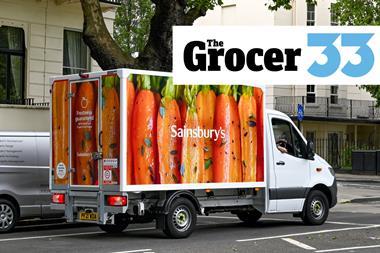Sainsbury undertook the biggest grocery tracking project in the world and is now preparing for the first stages of implementing a smart' science
Tracking products around the supply chain often used to be a matter of inspired guesswork. Now it's about to become an exact science, thanks to the introduction of RF-ID "smart tags". These credit card size devices store information about the products or crates to which they are attached and can be interrogated or updated automatically by radio signal. They enable the location, history and status of every product in the warehouse indeed the entire supply chain to be known with absolute precision.
The technology is not new, but it's only just starting to be used in grocery logistics. Woolworths, Marks & Spencer and Sainsbury trialled it last year in conjunction with Tibbett & Britten, one of the innovators in this area.
The Sainsbury trial, comprising three major pilot studies over a two year period, was the largest RF-ID grocery product tracking exercise undertaken anywhere in the world. Run at Tibbett's Allington depot in Kent, the trials tracked chilled foods with a short shelf life supplied in re-usable plastic crates and were designed to identify the business benefits to Sainsbury's supply chain.
Two tag reading portals were installed, and stock movements into the warehouse from chilled food suppliers were automatically recorded by passing wheeled dollies through them carrying up to 40 tagged crates at a time.
Slower moving products were manually enrolled on to the system using hand-held terminals capable of reading either traditional barcodes or the new smart tags.
Tag readers at strategic locations in the warehouse automatically updated the computerised warehouse management system with the storage position of each crate, along with information about weight and sell-by date. This enabled the system to know which crates should be picked first to ensure correct product rotation.
Benefits identified by the trial included:
- line of sight communication is not required because many items can be read or written to simultaneously
- the system is virtually error free as there's no manual data entry
- less product damage due to reduced handling to locate barcodes
- easy identification and removal of sub-standard or contaminated products.
Sainsbury project manager Mark Gillott is pleased with the results. "They are very impressive and have demonstrated a strong case for introducing smart tagging technology into the crated supply chain. The aim now is to design and establish trials that will form the first stage of an implementation programme. Unlike earlier trials, these will not be turned off after a set period, but will continue to run and increase in scale over time."
{{FOCUS SPECIALS }}
Close menu
- Home
- Retail & Wholesale
-
Products & Suppliers
- Back to parent navigation item
- Products & Suppliers
-
Product Categories:
- Back to parent navigation item
- Product Categories:
- Alcoholic drinks
- Bakery
- Cereals & breakfast
- Cheese
- Chicken & poultry
- Chocolate
- Confectionery
- Crisps, nuts & snacks
- Dairy
- Fish
- Fresh produce
- Frozen
- Household
- Meat
- Own Label
- Sauces & condiments
- Seasonal
- Soft drinks
- Vaping
- Vegan & plant-based
- World foods
- Suppliers
- People
- Reports & Data
-
Topics A-Z
- Back to parent navigation item
- Topics A-Z
-
Popular topics:
- Back to parent navigation item
- Popular topics:
- Cost of living crisis
- Crime
- Deposit Return Schemes
- Finance
- Government & Regulation
- Health
- Inflation
- Loyalty
- Marketing
- Mergers & Acquisitions
- New Product Development
- Sourcing
- Supply chain
- Sustainability & environment
- Technology
- Ultra Processed Foods
- Vaping
- A-Z all topics
- Content by type:
- Events
- Ask iA (beta)
- Subscribe now
Sign in to comment on this article
Not logged in before? Register for FREE guest access today.
You will be able to:
- Read more stories
- Receive daily newsletters
- Comment on stories
Advert
















No comments yet